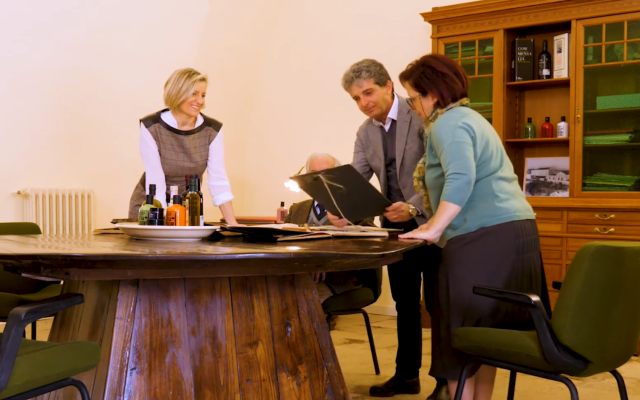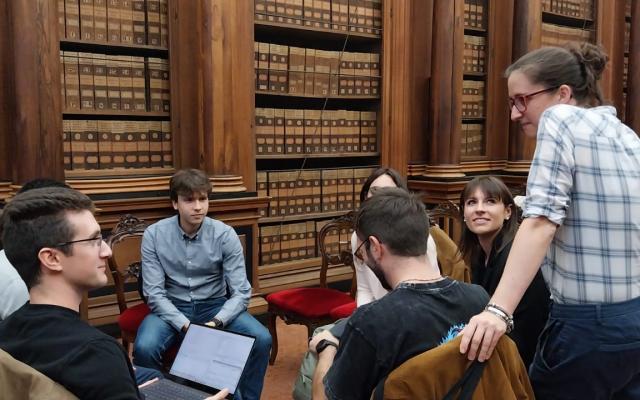Wed, 28/04/2021
The fourteenth edition of RomeCup, the event dedicated to educational robotics and promoted by the Fondazione Mondo Digitale was inaugurated on April 27. Speakers at the opening conference included Italian Minister for Youth Policy Fabiana Dadone; the Mayor of Rome, Virginia Raggi; Manuela Veloso, Director of JP Morgan AI Research and former professor at the Carnegie Mellon University Computer Science School, and Giuseppe Averta, Italian winner of an award for the best doctoral thesis on robotics. The event will continue through April 29 and then on May 12-15. It will be livestreamed on RomeCup.org: lectio magistralis, talks, university contests, robotic competitions, hackathons to explore the most inclusive and transformative frontiers of technology, from finance to health and environmental safeguard. Over 1000 students will be connected in videoconference for the opening conference, 100 Italian school teams will participate in activities and 20 universities and start-ups are involved.
It is estimated that by 2025, artificial intelligence will have an impact of ten thousand billion euro on global productivity. While, on the one hand, AI represents a strategic factor for the post-pandemic economic recovery, on the other, it is increasingly evident that its use must be regulated to take into consideration ethical and human factors. In the near future, will artificial intelligence systems explain the decisions they make and take responsibility for them? Will the devices be transparent about their actions?
“Artificial Intelligence (AI) is an opportunity for computing to combine understanding of data, decision making, and execution. The goal is for AI and humans to coordinate so that AI can assist humans in their task, while being able to perform tasks and explain themselves, while humans can also help Ai through intelligent interaction and feedback. The future will be a symbiosis between humans and AI, where AI can take the form of physical or software robots”, explained Manuela Veloso, Director of JP Morgan AI Research and former professor at the Carnegie Mellon University Computer Science School, at the opening conference for the 14th edition of RomeCup. Since 2007, this event on educational robotics promoted by the Fondazione Mondo Digitale has spread innovation by connecting schools, research centres, companies, universities and institutions with an original strategic vision: new generations as enabling technology for development.
“Every institution must feel responsible for focusing on the education of youth, to reap every opportunity that will present itself with the new plan of investments that our country is promoting together with the European Union,” pointed out Mirta Michilli, Director General of the Fondazione Mondo Digitale. “We have to bridge the gap between supply and demand in the scientific and technological fields. Our two key words are education and orientation. We have to aim on training school coaches, on the one hand, and a more efficient orientation, based on positive models, on the other, to help young men and women to correctly select a course of studies and life,” emphasised Italian Minister for Youth Policy Fabiana Dadone.
“We have to mould tradition and innovation to drive Rome into a smart, innovative, inclusive and sustainable future. This is the message of ROMECUPLAY that we share and support. This event represents an opportunity to debate crucial issues, including the future of public administrations. The objective is to simplify and expedite activities through transparency and training, which makes technology and innovation our best allies. Robotics has progressed by leaps and bounds. We are in the middle of a revolution that we must capitalise on and exploit its vast potential. Many schools are inserting educational robotics into their curricula as a tool for learning and inclusion as it is involving and stimulating, motivating students. Besides didacts, technology has also helped with the health emergency, one of the great challenges of the future,” explained Virginia Raggi, Mayor of Rome.
“Observing and especially participating in the incredible boom of robotics and artificial intelligence makes us proud, especially given the fact that, as Italians, we are experiencing it as protagonists,” declared Giuseppe Averta, the twenty-eight-year-old from Calabria who won the prestigious Georges Giralt PhD Award for the best doctoral thesis on robotics in Europe.
Follow RomeCup live on RomeCup.org on April 27.29: from lectio magistralis to contests held in collaboration with schools and universities on robotic technology applied to agriculture, rehabilitation, assistance, transports and the marine environment; from educational robotics labs for schools to hackathons to simplify company digital transformation processes, designing innovative solutions to climate change and the post-Covid-19 emergency. The objective is to interest young men and women in studying scientific subjects and provide them with the skills necessary for the new professional profiles emerging on the labour market.
RomeCup will continue on May 12-15 with competitions held in collaboration with the Robocup Junior Academy. Rescue, football and dancing robots will be designed and programmed by students competing to represent Italy at the World Robotics Championships on June 22-28 in the “worldwide” version.
The fourteenth edition of RomeCup is supported by: Dell EMC, SAP, Regione Lazio, Lazio Innova, Invitalia, Sapienza Università degli Studi di Roma, Università Campus Bio-Medico di Roma and RoboCup Junior Academy.
Dai media
- Rai News, Robotica educativa: tornano le gare di RomeCup. La ministra Dadone: esempio di resilienza
- La Repubblica, Manuela Veloso: “Così ho portato robotica e intelligenza artificiale nell’alta finanza”




